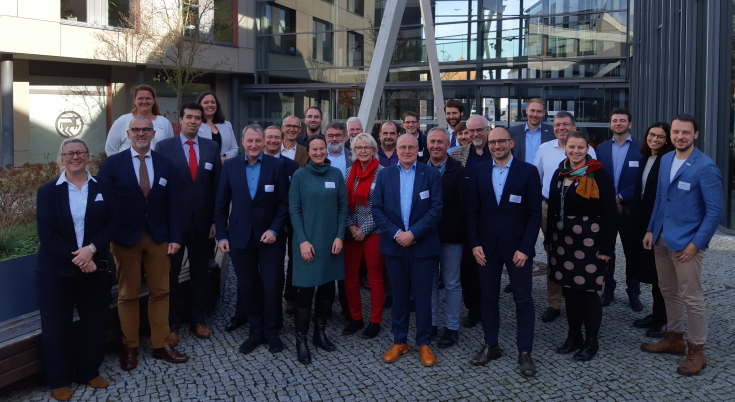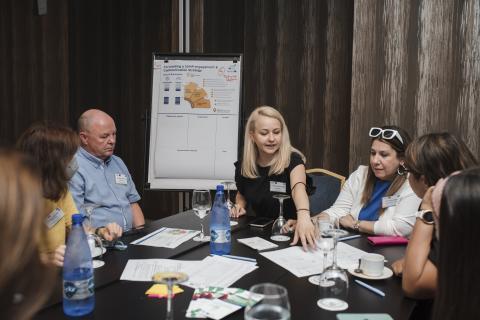Deriving local value from green hydrogen

On 8 and 9 November 2022, the Policy Learning Platform organised an onsite peer review for the benefit of the district of Barnim at the district capital Eberswalde, to address the policy challenge of “Deriving local value from renewable energy capacity and creating a green hydrogen value chain for the benefit of the local territory”.
A detailed list of challenges and recommendations can be found in the follow-up report.
Current state of affairs
The region has ample renewable energy sources, but the local population derives almost no socio-economic benefit from them. E.g. the multiple wind parks are largely owned by foreign investors, the electricity goes into the national grid and the financial benefits go to the investors.
The district administrations of Barnim and Uckermark now wish to increase the local added value and have two strategic objectives:
- To use the local (excess) wind energy for onsite production of green hydrogen through electrolysis
- To build a green hydrogen value chain based on locally available resources and local costumers with the help of local companies.
In this context, the administrations were keen to discuss with the peers the draft hydrogen strategy of the Uckermark-Barnim region and to hear about emerging business models and legal frameworks for sector-coupling (power to hydrogen).
In particular, they were keen to explore what end-uses for green hydrogen may represent feasible options for the Uckermark-Barnim region.
Peers from across Europe
Alongside Katharina Krell and Astrid Severin, our low carbon economy and environment and resource efficiency Thematic Experts, five excellent peers were invited, and participated in the peer review:
- Fernando Palacin, Hydrogen Foundation Aragon, Spain
- Julien Jimenez, Energy and Climate Department – Regional Government Nouvelle-Aquitaine, France
- Nikolaos Ntavos, CluBE-Cluster of Bioeconomy and Environment of Western Macedonia, Greece
- Kevin Schalk, Fraunhofer Institute for Wind Energy Systems & Bremerhaven local hydrogen network “H2BX, Germany
- Florian Widdel, German Renewable Energy Federation BEE, Germany
The international team was rounded off by Verena Priem from the Interreg Europe Joint Secretariat and Thorsten Kohlisch and Sorush Brandenburg from the Policy Learning Platform.
Recommendations
The experts provided the host with valuable insight, know-how and practical suggestions for solving the challenges presented above, starting with a few key insights:
The question is only when. This gives some security for policymakers and all willing players. But pilot activities are always risky due the regulatory and commercial insecurity.
It will be one of the solutions to decarbonise our economy.
While each region is responsible for its own strategy, this strategy must be compatible with the larger system requirements (national or even EU level) and should not be developed in isolation.
The boundary of the system should not be too narrow (i.e. Barnim-Uckermark might have excess RES capacity, but Germany as a whole does not).
All successful hydrogen regions are heavily involved in European projects to share knowledge, develop joint solutions and acquire public funding.
A dedicated governance structure to drive hydrogen strategy development and continuous updating, stakeholder involvement, participatory planning and implementation is very helpful and fosters local ownership of the strategy and future projects.
Can help speed up the own development, avoid reinventing the wheel and de-risk own undertakings. Many knowledge resources exist at EU level for immediate access.
The experts then detailed recommendations with regard to strategy development and governance structures, and provided insights into sector-coupling from their home regions.
They stressed that green hydrogen will remain a scarce commodity in the mid-term and should be primarily used in areas where electrification is hard to achieve.
Attention was also paid to skill availability and the opportunities to create new job profiles. The experts pointed out multiple funding opportunities at EU level and stressed that there is currently no or only a rather limited role for private funding due to the still high-risk profile of hydrogen projects due to regulatory insecurity and high prices reflecting a low technology and market maturity.
The peers also noted that all successful H2 regions in Europe are heavily involved in EU R&I projects and that this sharing of problems and solutions, methodologies and lessons learned helps regions advance faster locally.
The host’s policy challenges and all the peer suggestions can be found in the follow-up report.
Pleased with the outcome of two full days of intense talks moderated by the Policy Learning Platform, the hosts reported that the experience had been very helpful and informative to them. Peer review host Dr Wilhelm Benfer said:
The peer review has given an impetus and set something in motion. It’s good to see we’re not alone. We’re grateful for the commitment of the peer experts and as well to the Policy Learning Platform. We benefitted very much for the format of this peer review. Through the peer review we have no more excuse to drag our feet and we know we must get moving quickly, now.”

Apply for a peer review!
Find solutions to your regional policy challenges with our experts and selected peers during a two-day peer review.
Peer Review Barnim-Uckermarck Final Report
Peer Review Barnim-Uckermarck Final Report
